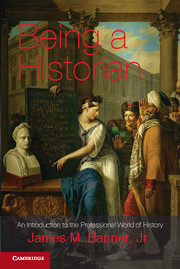Book contents
- Frontmatter
- Contents
- Preface
- Acknowledgments
- 1 The Discipline and Professions of History
- 2 The Structure of the Discipline of History
- 3 A Multitude of Opportunities
- 4 The Academic Trinity
- 5 History outside the Academy
- 6 Teaching and Writing History
- 7 Professional Principles, Responsibilities, Rights
- 8 Being Oneself as Historian
- Index
- References
3 - A Multitude of Opportunities
Sites, Forms, Kinds, and Users of History
Published online by Cambridge University Press: 05 June 2012
- Frontmatter
- Contents
- Preface
- Acknowledgments
- 1 The Discipline and Professions of History
- 2 The Structure of the Discipline of History
- 3 A Multitude of Opportunities
- 4 The Academic Trinity
- 5 History outside the Academy
- 6 Teaching and Writing History
- 7 Professional Principles, Responsibilities, Rights
- 8 Being Oneself as Historian
- Index
- References
Summary
When people conceive of becoming historians in our era, it is difficult for them to imagine how many types of work a career in history can entail, in how many places it can be pursued, the forms that the results of historical thinking can take, and the number and variety of the audiences desirous of historical knowledge that exist. Moreover, historians in the seedtime of their careers often fail to learn – because they are rarely prepared to see – how the choices that they face are necessarily determined substantially by each other. The kind of history work one undertakes, say as college faculty member or museum curator, affects the freedom of choice of one's intellectual pursuits, just as the audiences to which one seeks to appeal, say film viewers or readers, affect the ways in which the fruits of one's knowledge are presented. While this may go without saying, the preparation of historians in fact rarely takes these interlocking considerations into account even though they all hold freighted consequences for the larger discipline as well as for individual historians.
Without doubt, the principal choice each historian must make is the kind of history work to pursue. Yet despite the significant broadening of professional historical pursuits in the past fifty years and the increased prospect of having one's professional self-respect remain intact outside the academy, the gravitational force of all history preparation continues to draw historians overwhelmingly to careers as academic faculty members. Precisely because of this force, the most searching examination of one's own hopes, talents, and personality ought to go into a choice of profession; becoming an academic should not occur by default. Nevertheless, that most aspiring historians envisage themselves as academics without much thought should not be surprising. It was around the academic ideal that professional history first took form in nineteenth-century Germany. Those who prepare other historians – the knights of the discipline – are themselves faculty members who serve at the lectern and seminar table as exemplars, albeit usually of one kind only, of what historians can do and become. Alternative models of historians – professional knights errant – are rarely seen in graduate school classrooms, and if, as some do, nonacademic historians teach graduate courses in universities, when they do instruct others they serve in the role of what students know and expect; that is, they serve as faculty members.
- Type
- Chapter
- Information
- Being a HistorianAn Introduction to the Professional World of History, pp. 63 - 95Publisher: Cambridge University PressPrint publication year: 2012



